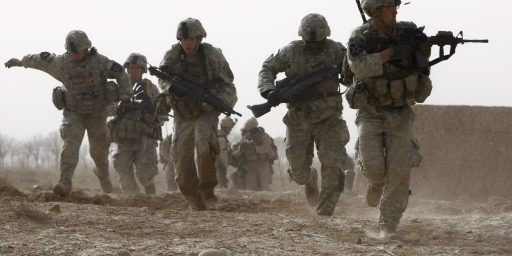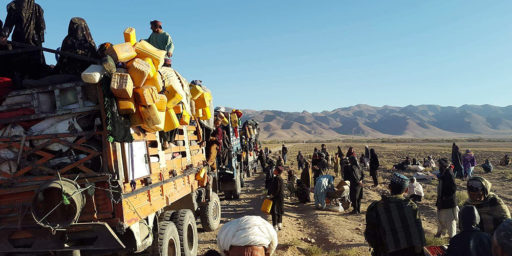Still Losing the War on Drugs
Misha Glenny has an excellent article regarding the ongoing failed policy of drug prohibition, especially in how it relates to the War in Afghanistan.
Poppies were the first thing that British army Capt. Leo Docherty noticed when he arrived in Afghanistan’s turbulent Helmand province in April 2006. “They were growing right outside the gate of our Forward Operating Base,” he told me. Within two weeks of his deployment to the remote town of Sangin, he realized that “poppy is the economic mainstay and everyone is involved right up to the higher echelons of the local government.”
Poppy, of course, is the plant from which opium — and heroin — are derived.
Docherty was quick to realize that the military push into northern Helmand province was going to run into serious trouble. The rumor was “that we were there to eradicate the poppy,” he said. “The Taliban aren’t stupid and so they said, ‘These guys are here to destroy your livelihood, so let’s take up arms against them.’ And it’s been a downward spiral since then.”
This, of course, is just one more example of the lost long-ago War on Drugs. As Glenning points out, the illegal drug trade is a booming global industry–a fact which threatens national security:
Thirty-six years and hundreds of billions of dollars after President Richard M. Nixon launched the war on drugs, consumers worldwide are taking more narcotics and criminals are making fatter profits than ever before. The syndicates that control narcotics production and distribution reap the profits from an annual turnover of $400 billion to $500 billion. And terrorist organizations such as the Taliban are using this money to expand their operations and buy ever more sophisticated weapons, threatening Western security.
In the past two years, the drug war has become the Taliban’s most effective recruiter in Afghanistan. Afghanistan’s Muslim extremists have reinvigorated themselves by supporting and taxing the countless peasants who are dependent one way or another on the opium trade, their only reliable source of income. The Taliban is becoming richer and stronger by the day, especially in the east and south of the country. The “War on Drugs” is defeating the “war on terror.”
The entire opium trade is, of course, illegal just about everywhere, meaning that the money made from it inevitably falls into the hands of criminal enterprises which can use it to cause other types of mayhem, too. Read the whole thing.





Yeah, it’s sad. The “war on murder”, “war on stealing”, and every war on (put crime in here) has failed. It seems even if we outlaw and enforce certain activities they still happen.
Maybe we should just legalize everything since that would be so much easier and we wouldn’t have to spend any money at all on law enforcement.